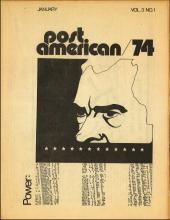Like a lion stalking its prey, Japan and the United States are taking initial steps in the economic exploitation of a newly independent underdeveloped country.
On December 1, 1973 Papua New Guinea became self-governing after decades of direct rule by Australia, which had administered the small country to its north as a United Nations trust territory. Within the next two years Papua New Guinea will gain total control of its defensive and foreign affairs.
Papua New Guinea, which shares the 250,000 square mile island with Irian Jaya (Indonesia), has long been an economically strategic area for Australia. Australian private interests have exerted what one Sydney newspaper called a “stranglehold” on the economy of the emerging new nation. Australian companies control 50 per cent of the transport and communications, 75 per cent of the manufacturing, building and construction, 85 per cent of the commerce and 90 per cent of the activity in finance and property
Developing ominous signs, however, indicate that the major threat to Papua New Guinea’s economic independence will not come from Australia. Both Japan and the U.S. are beginning to take more solid steps into the country's economic situation. Japan is making inroads with investments totaling $60 million, a 12-fold increase in the last two or three years, with more in the planning stage. The Kennecott Copper Company of the U.S., a major investor in Chile, is involved in exploration for minerals.
Read the Full Article

